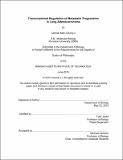| dc.contributor.advisor | Tyler Jacks. | en_US |
| dc.contributor.author | Li, Carman Man-Chung | en_US |
| dc.contributor.other | Massachusetts Institute of Technology. Department of Biology. | en_US |
| dc.date.accessioned | 2015-09-17T17:41:38Z | |
| dc.date.available | 2015-09-17T17:41:38Z | |
| dc.date.copyright | 2015 | en_US |
| dc.date.issued | 2015 | en_US |
| dc.identifier.uri | http://hdl.handle.net/1721.1/98545 | |
| dc.description | Thesis: Ph. D., Massachusetts Institute of Technology, Department of Biology, 2015. | en_US |
| dc.description | This electronic version was submitted by the student author. The certified thesis is available in the Institute Archives and Special Collections. | en_US |
| dc.description | Cataloged from student-submitted PDF version of thesis. | en_US |
| dc.description | Includes bibliographical references. | en_US |
| dc.description.abstract | Lung cancer is the most prevalent cancer type, leading to more than one million deaths per year worldwide. The vast majority of these mortalities were attributed to metastasis, which is the dissemination of tumor cells from the lungs to other organs. The molecular mechanisms for metastasis is complex and not well understood. In this thesis, I investigated the gene expression changes in tumor cells that contribute to metastasis of lung adenocarcinoma, the major subtype of lung cancer. Using a genetically-engineered mouse model and derivative cell lines, we showed that metastatic lung adenocarcinoma cells are capable of forming proteolytic membrane protrusions known as invadopodia to degrade the extracellular matrix. The formation and function of invadopodia are dependent on an isoform switch of the adaptor protein Tks5. The Tks5long isoform, which is upregulated in metastatic cells, is capable of localizing to the cell membrane and activating invadopodia formation. In contrast, the Tks5short isoform, which is transcribed from a promoter independent of Tks5long, is the predominant isoform in non-metastatic cells, and functions to inhibit invadopodia-mediated matrix degradation by destabilizing these protrusions. We demonstrated that an increased ratio of Tks5long-to- Tks5short promoted invadopodia activity in vitro and metastasis in vivo. Furthermore, a high Tks5long-to-Tks5short ratio in human tumors correlated with advanced stage and worse survival. These data strongly suggest that a balance between Tks5long and Tks5short expression is critical for metastasis. In addition, we found that the expression of the pro-metastatic Tks5long isoform is synergistically inhibited by three transcription factors - Nkx2-1, Foxa2, and Cdx2. These three factors were highly expressed in non-metastatic cells, and downregulated in metastatic cells. Altered expression of these factors led to commensurate changes in Tks5long levels. Finally, we demonstrated that Nkx2-1, Foxa2, and Cdx2 function cooperatively to inhibit metastasis by suppressing a network of target genes. Silencing of all three factors in non-metastatic cells activated a program of metastasis-related genes, and increased metastasis in a transplantation model. Furthermore, the expression patterns of these factors strongly correlated with tumor progression in an autochthonous model of lung adenocarcinoma, and were closely associated with disease stage and survival outcomes of human patients. Collectively, these findings strongly argue that Nkx2-1, Foxa2, and Cdx2 synergize to restrain metastatic progression. Taken together, this study provides insights on some of the key molecular regulators of lung cancer metastasis. Our findings contribute to a better understanding of metastasis, and potentially to the development of better therapeutic strategies in the future. | en_US |
| dc.description.statementofresponsibility | by Carman Man-Chung Li. | en_US |
| dc.format.extent | 188 pages | en_US |
| dc.language.iso | eng | en_US |
| dc.publisher | Massachusetts Institute of Technology | en_US |
| dc.rights | M.I.T. theses are protected by copyright. They may be viewed from this source for any purpose, but reproduction or distribution in any format is prohibited without written permission. See provided URL for inquiries about permission. | en_US |
| dc.rights.uri | http://dspace.mit.edu/handle/1721.1/7582 | en_US |
| dc.subject | Biology. | en_US |
| dc.title | Transcriptional regulation of metastatic progression in lung adenocarcinoma | en_US |
| dc.type | Thesis | en_US |
| dc.description.degree | Ph. D. | en_US |
| dc.contributor.department | Massachusetts Institute of Technology. Department of Biology | |
| dc.identifier.oclc | 920672720 | en_US |
